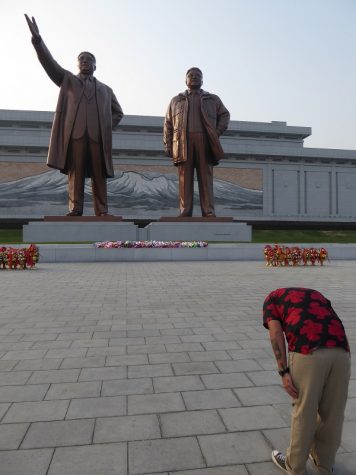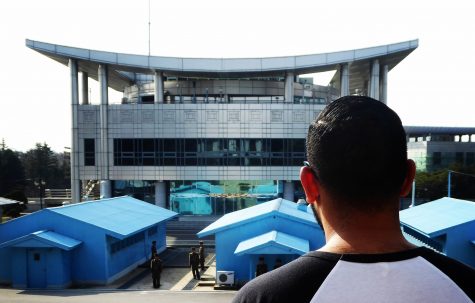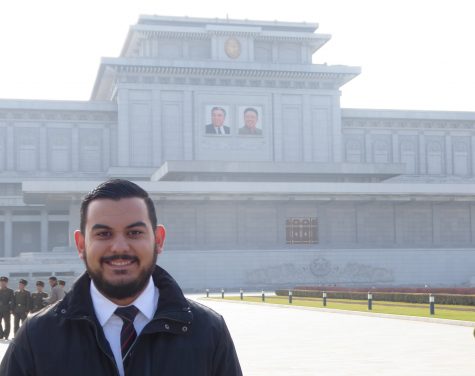
Visiting North Korea, I can honestly say, was an experience unlike anything I could have imagined. We hear so much about it but what do we really know? Watching documentaries on the subject was no longer enough, and neither was anything else from a western perspective. I had to see it for myself, with my own eyes, separate from any other influence.
Booking the trip was incredibly easy as I literally Googled “North Korea tourism” and found several tour companies on the first page. After a wire transfer of funds and filling out some travel documents, I was all set. I met with other tourists from my tour group in Beijing the day before we left, where we were all given a briefing on the rules and what to expect once we were inside the Democratic People’s Republic of Korea.
The next morning, we flew from Beijing to Pyongyang, which took about an hour and a half. The airline we took was the only one North Korea has- Air Koryo, whose planes I found to be more spacious than coach on my United Airlines flight into China. The flight was quick, and we were treated to a burger that tasted oddly sweet. I found out later that the Korean men on my flight were actually the North Korean soccer team, who were returning home from a win against Hong Kong.
Not sure what it is, but waiting in line at customs in airports always makes me feel uneasy, and this time was no different. My hands were so sweaty that my passport was visibly wet. I had stuffed my health card and travel papers inside my passport so they wouldn’t get destroyed. When it was my turn, I walked up to the glass booth and gave the lady my passport with the travel papers inside. I didn’t know what to expect. I filled out my travel papers correctly, right? Is it because I’m American? Why am I so nervous? The lady glanced at my papers briefly, then took one look at my passport, and then at me. She smiled and said, “When was this photo taken?” “A few years ago, before I grew a beard and lost weight” I replied. She smiled and laughed, then let me through. I had no idea it would be so easy to get into North Korea. From that moment on, almost nothing I experienced was quite like western media said it would be. Airport security was a breeze, even easier than back in the states where TSA makes you feel like you hid a grenade in your pocket when you forget to take off your shoes. Even the airport in Pyongyang was almost nicer than the one in San Diego. So then what? I’m confused here, isn’t this place not supposed to be nice? Isn’t everyone supposed to hate me? Turns out, most of what I knew or thought I knew about North Korea was about to be completely shattered.
After having such an easy experience at airport security, I was not surprised by how friendly my North Korean guides were. The tour started immediately, with our main guide telling us all about the DPRK on the way into Pyongyang. As much as I wanted to listen to our guide, I was having a difficult time following along since I was still in shock at just how different everything was turning out to be.
Once we reached the inner city, the first thing everybody noticed was how much traffic there was, and how many nice cars were on the road. Then one minute, all of the cars on the road stopped to make way for a line of white buses that passed through everybody. Our guide told us that those were considered the elite citizens of Pyongyang, the best and the brightest from every industry.
The hotel I stayed at in Pyongyang was called Sosan Hotel which means “western mountain” hotel. Once again, it was a lot nicer than I expected. I thought I would be sleeping on a plastic mat in a dimly lit place, somewhere you would have to bring your own toilet paper and a flashlight. Turned out my hotel was even nicer than the place I stayed at in Beijing a day earlier. Hot water, I was told, would be rationed, but I was able to get it anytime I wanted.
As my first night in Pyongyang was coming to an end, I kept thinking to myself, “Where is all the freaky stuff I’ve heard about?” Well, the next day was when the “freaky stuff” started, beginning with a bus ride to Kaesong and Panmunjom to visit the Demilitarized Zone or DMZ. North Korea called it the Military Demarcation Line. The view from the drive out of Pyongyang to the south slowly started to look more like what I had seen on TV. The further we went, the more empty the roads became, and more bumpy. We stopped halfway to Kaesong at a rest stop, where some of us were encouraged to buy Korean ginseng, which I saw at almost every single shop I visited.
We were told not to photograph any poverty or military while on the bus, or really anywhere for that matter. My impression was that I would be closely watched while taking photos, and that any I took would be looked over and approved of before I left the country, but more on that later. I was surprised by how laid back the guides were once everybody started taking photos from the bus. The only time I saw them hesitate was whenever we passed through a military checkpoint, which there were plenty of. Even then, we were told to just keep our cameras out of sight long enough to drive by each checkpoint.

The actual DMZ looked almost exactly as I had seen from TV, but was missing the extreme tension in the air that everybody loves to mention. My group took a photo together with a serious looking soldier, and the smiles on our faces would make you think we were in front of Sleeping Beauty’s castle at Disneyland, not in front of the edge of the hermit kingdom. That day there weren’t even people on the south side which certainly seemed odd. By this point, I really began to question everything I had been told, and it was driving me crazy.
The next day, our group was taken to Kumsusan Palace of the Sun, the final resting place for Kim Jong Il and his father Kim Il Sung. This is where we were shown the actual bodies of their dead leaders, after a heavy security check. The dead leaders looked like they were taking a nap in a glass coffin, almost like they were still alive. We had to bow three times at each leader- once at their feet, then their left side, and then the right. Every tourist is required to bow at certain statues and monuments, while keeping their hands to their sides. At some places, somebody in our group had to leave a small bouquet of flowers as a token of respect, before we all bowed together.

The food was not always bad, some of the meals we had were actually quite delicious. Rice with veggies, aka Bibimbap was nice, and so was the barbecued duck that was served on the last night. It was no surprise that kimchi was standard with every meal, and so was steamed rice. I’m a very picky eater so I stuck with lots of veggies and rice, but after we came back from the DMZ, I was offered “sweetmeat” soup. What is “sweetmeat?” Dog. I couldn’t get myself to buy a bowl but I did manage to try a small piece when a gentleman at my table offered. It tasted exactly like beef, and if nobody would’ve told me it was dog, I would have been convinced beyond a doubt that the meat came from a cow. I thought the soup also tasted exactly like caldo de res, so just remember that next time you go to a taco shop.
The few interactions I had with locals besides my tour guides were pleasant. At a souvenir shop on my last night, the clerks working there asked me where I was from. Upon hearing I was American, their reaction was definitely a surprised one, but not one with animosity. They smiled and said they were glad to see an American there. Funny, because that was the same reaction I got from some of the other foreign tourists in my group. It became clear early on that the locals did not have any prejudice towards the west or its people, despite what their government tells them. Both times in the Pyongyang airport, I noted the reactions I got when holding my American passport. I certainly got some surprised looks, but none that made me feel unwelcome or hated.
Going through airport security on my way out certainly got me nervous again. I thought they would look through every photo I took and inspect everything I had in my luggage and on my phone. When it came time, I showed airport security my phone and camera, the man then asked me, “OK, what did you buy?” I showed him all of the posters and books I bought, and then he asked me for a receipt. He then logged in every poster I bought into a book, and then he said, “OK, you can go.” That was literally it. My phone and camera were never even turned on, and I was out of the country about two hours later.
If given the chance, I would definitely go back and visit again. There was so much I saw, yet there is still so much that remains a mystery. It might seem hard to believe, but many times I almost forgot where I was once I got to know everybody. Every night ended with a drink among friends and a shorter bucket list.
